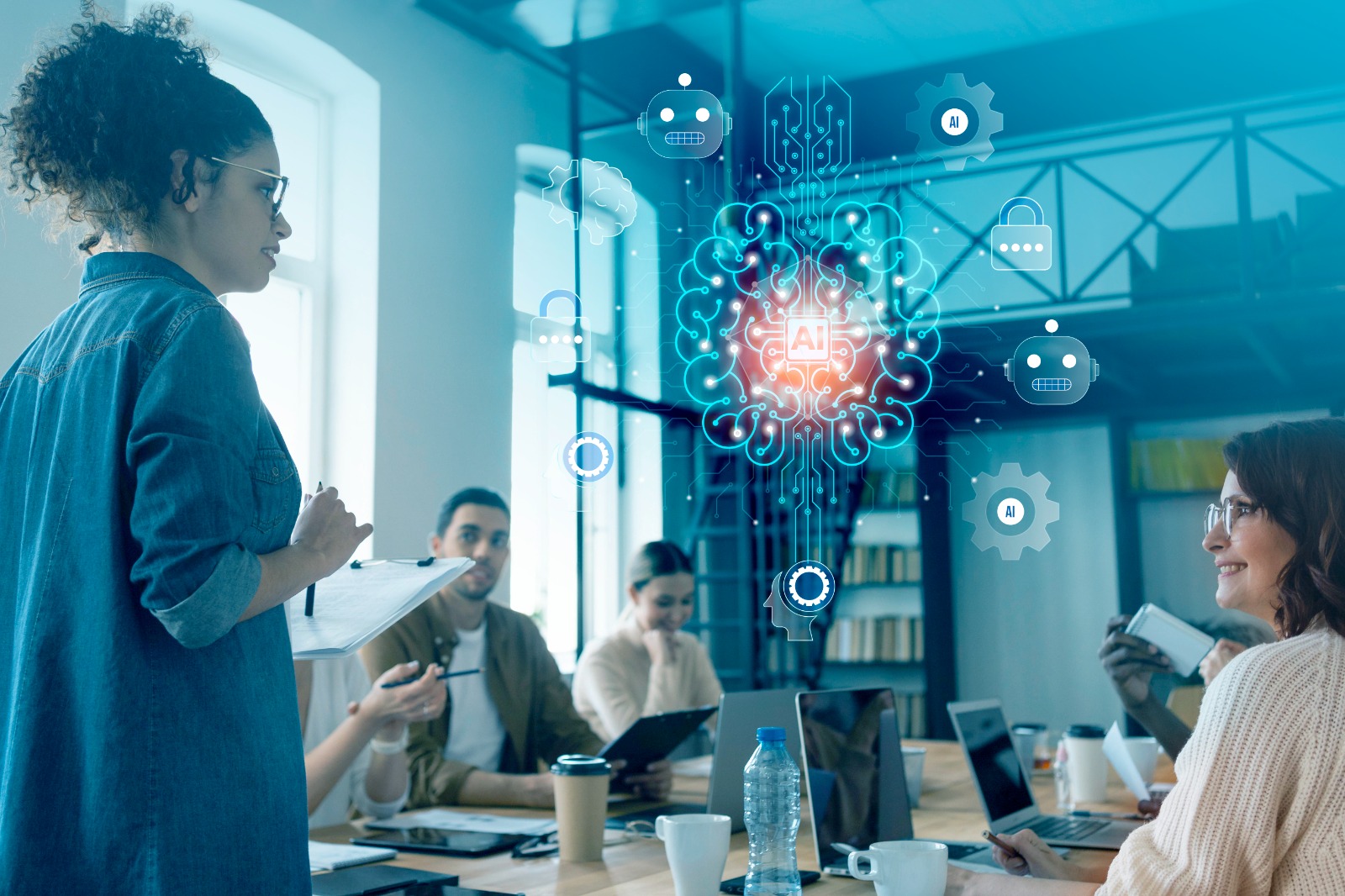AI for Social Good: How It Can Be Used to Tackle Global Challenges
 Infolks
Infolks
Artificial intelligence is now being used in various sectors, and one new trend is its application for social good. While AI isn't a complete solution for the world's toughest social and environmental problems, it can provide tools to address pressing issues and create positive impacts.
Many companies are partnering with non-profit organizations dedicated to tackling global social, economic, and environmental challenges. They are also investing in enterprises that use AI to improve social diversity, equity, inclusion, and sustainability.
Addressing Global Challenges
Our world is battling with a range of complex and interconnected issues, like healthcare inequalities, climate change, humanitarian crises, and educational disparities. These challenges have widespread consequences, calling for innovative solutions to forge a better future for individuals and communities worldwide.
The Role of AI in Driving Positive Social Impact
Artificial intelligence, armed with its ability to process vast amounts of data, make predictions, and automate tasks, has emerged as a potent tool for addressing global issues. AI has the potential to offer efficient, cost-effective, and adaptable solutions, allowing us to make significant progress in areas that were previously daunting. In this exploration of "AI for Social Good," we will look into the specific applications, challenges, ethical considerations, and the potential for further advancements in AI to confront and overcome these global challenges.
AI Application in Healthcare
Artificial Intelligence (AI) has made significant advancements into the healthcare sector, revolutionizing various aspects of the industry. AI for social good in healthcare has a wide range of applications that aim to address global challenges and improve the well-being of individuals and communities.
AI is making a big impact in healthcare, especially in early disease detection. Special computer programs can look at medical images very accurately, helping find diseases like cancer early on. Google's DeepMind Health has an AI tool that's even better than human radiologists at finding breast cancer. Finding diseases early means patients can get treatment sooner, improving their chances of getting better.
Another way AI helps in healthcare is personalized medicine. Computers can use patient information to predict how a disease might get worse and suggest personalized treatment plans. This not only helps patients but also makes healthcare better by avoiding trial-and-error treatments. AI is also helping in places where healthcare is not easy to get. In many parts of the world, healthcare is limited, and AI can help by figuring out the best way to use limited resources. For example, Zipline uses AI-powered drones to deliver medical supplies to remote areas in Rwanda.
Big companies, like IBM and GE, are working with healthcare providers to make AI tools. IBM Watson Health is working with Memorial Sloan Kettering Cancer Center to make an AI system for cancer diagnosis and treatment. GE Healthcare and Nvidia are also working together to make an AI system for analyzing medical images. These partnerships show how AI is becoming a crucial part of improving healthcare.
Environmental sustainability and AI
Artificial Intelligence (AI) plays a vital role in environmental sustainability by monitoring climate change, managing natural resources, and promoting sustainable development. AI analyzes satellite data to monitor deforestation, track wildlife, and predict natural disasters. For instance, Wildlife Insights identifies species from camera trap images, aiding conservation. AI optimizes resource management by analyzing weather, soil, and crop data to improve agricultural practices, reducing water usage and fertilizer runoff. It also facilitates sustainable development by analyzing energy, transportation, and waste data. Barcelona's Smart Cities project, for example, uses AI to enhance traffic flow and reduce emissions.
Notable AI-driven projects include OceanMind, which monitors illegal fishing, and Rainforest Connection, which detects illegal logging using AI-powered sensors, safeguarding marine and rainforest ecosystems, respectively. These initiatives demonstrate AI's potential in creating positive environmental outcomes.
AI in Education
AI is changing education by making learning personal and accessible to all. Intelligent tutoring systems powered by AI can adapt to each student's needs, offering tailored instruction and feedback based on their performance. This allows students to learn at their own pace and excel in areas they find challenging. AI also addresses educational gaps by breaking down barriers. Tools like language translation systems and virtual classrooms powered by AI enable students to access educational resources from anywhere, promoting inclusivity and ensuring that everyone has the opportunity to learn. Another benefit is the scalability of AI in education. Online platforms with AI algorithms can deliver personalized content, assessments, and feedback to a large number of students simultaneously. This is especially helpful in areas with limited educational resources or during crises when traditional classroom-based education may not be possible.
Successful examples of AI in education include the Khan Academy, which uses AI algorithms to guide students through personalized learning paths. Duolingo, an AI-powered language learning platform, adapts lessons based on individual progress, offering instant feedback. The Georgia Institute of Technology has introduced an AI teaching assistant named Jill Watson, using natural language processing to answer student questions in online forums, helping both students and human instructors.
Ethical Considerations
Using Artificial Intelligence (AI) for the betterment of society is promising, but it brings up important ethical concerns. Let's look at a few of these issues and discuss why responsible AI development is crucial in social settings. One big worry is bias in AI. If algorithms are trained on biased data, they can reinforce and magnify those biases, leading to unfair treatment in areas like hiring or the justice system. To address this, AI systems should be trained on diverse and representative datasets and regularly checked for bias.
Privacy is another ethical concern. AI often needs personal data to work well, but strong measures must be in place to protect people's privacy and ensure their data isn't misused. Being transparent and obtaining informed consent when using personal data in AI applications is essential. Security is a significant consideration too. As AI becomes more integrated into different systems, there's a higher risk of cyberattacks and malicious use of AI. Developers must prioritize security to prevent unauthorized access or data manipulation.
In social contexts, responsible AI development means thinking about the impact on individuals and communities. This involves creating fair, transparent, and accountable AI systems. Accessibility is crucial, ensuring that AI technologies don't make existing inequalities worse. In developing ethical guidelines for AI, involving a diverse group of experts, policymakers, and affected communities is vital. Collaborative discussions can help identify risks and create strategies to address them.Ongoing monitoring of AI systems is essential to fix any unintended consequences or biases. Regular audits, transparency reports, and external reviews maintain accountability and ensure that AI technologies align with ethical standards.
The Future
AI has the potential to positively impact various social causes in the future. One key area is healthcare, where advanced AI algorithms could analyze large medical datasets to identify patterns, predict health outcomes, and improve healthcare access in underserved areas. Another area is addressing climate change, where AI can monitor and manage natural resources, optimize energy consumption, and promote sustainable practices. AI-powered systems may predict and mitigate climate change impacts, optimize renewable energy production, and improve waste management.
In education, AI could lead to more personalized learning experiences, adaptive tutoring, and intelligent virtual assistants. AI algorithms might analyze individual learning patterns, making education more accessible and effective for learners of all ages and backgrounds. To make these advancements a reality, tech leaders should prioritize social impact in AI development, policymakers should create supportive regulations, and the public can advocate for increased funding and volunteer their expertise. By collectively investing in AI for social good, we can create a future where technology improves the well-being of individuals and communities worldwide.
Wrapping Up
Let's remember that AI isn't just technology—it's a way to make good things happen in our world. It can help improve healthcare, solve environmental problems, and change education for the better. If we use AI responsibly, we can make sure everyone benefits and create a fairer, safer world. So, how can we use AI to help our communities? How can we back projects that use AI for good? Let's work together to find out and make a better future where technology helps everyone.
Subscribe to my newsletter
Read articles from Infolks directly inside your inbox. Subscribe to the newsletter, and don't miss out.
Written by

Infolks
Infolks
We are a leading data labeling service provider. Our super-powered workforce labels precise and quality training data sets for AI and ML modules. We’re here to bring someone’s AI dreams into reality.